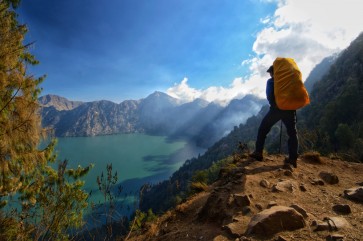Popular Reads
Top Results
Can't find what you're looking for?
View all search resultsPopular Reads
Top Results
Can't find what you're looking for?
View all search resultsDiscourse: ‘Our philosophy is to have a good system’
Thea Tsulukiani (Courtesy of Thea Tsulukiani)In an era when the most crucial thing for every government is to gain the trust of its own people, open government is seen as a necessity
Change text size
Gift Premium Articles
to Anyone
Thea Tsulukiani (Courtesy of Thea Tsulukiani)
In an era when the most crucial thing for every government is to gain the trust of its own people, open government is seen as a necessity. Georgian Justice Minister Thea Tsulukiani, who has led bold reforms in the areas of the rule of law, transparency and anticorruption efforts in Georgia and is the co-chair of the Open Government Partnership (OGP), recently shared her views about open government with The Jakarta Post’s Marguerite Afra Sapiie. The following are excerpts from the interview.
Question: Many believe open government is the key to answering development challenges, including to achieve the UN Sustainable Development Goals (SDGs). Can you share your views on the matter?
Answer: The OGP has been seen in Georgia as one of the best tools to ensure openness and transparency of the government, the parliament and the judiciary. In Georgia, the three branches of power and [...] sub-national authorities are involved in the OGP. This joint effort is very important to make the best use of what the OGP itself can offer to the member states.
When it comes to the SDGs, the OGP is very much related to different SDGs and the most relevant [is] the goal, aimed at ensuring inclusiveness. Open government provides for accountable and transparent governance; these are the basics for achieving inclusiveness. If the government is not open, it’s not able to guarantee to its own population any kind of inclusiveness in any field. So these two are related and we work very much with the UN and leading countries of OGP to strengthen the links.
Public service delivery was another effort of ours to allow not only speediness and transparency in delivering public services, but also accessibility and equality.
From your experience, what are the challenges in implementing open government?
Challenges can be bureaucratic. For instance, when you have to put in place a system, which is about delivering quick results, you [also] need a good and functional system that is flexible, clean and free of corruption […] In today’s world, countries face different threats [such as] terrorism and international
organized crime.
When you elaborate new laws and bold reforms to open the system up, to be more inclusive, to provide access to every kind of information, at the same time you are a government in charge of ensuring national security and avoiding threats. So to strike the fair balance between human rights and national security can sometimes be a challenge when you implement an OGP initiative, especially when you have ambitious national action plans, like in Georgia’s case.
You lead many kinds of bold reforms for open government, and all of them need the commitment of public officials themselves. How do you change their bureaucratic views, so they are willing to be open and provide transparency?
In Georgia there was a state philosophy [...] according to which you could fight bureaucracy and corruption if you could take away almost every civil servant; those who were corrupt [you] put in jail, others you send home and replace with young people. This was a very popular state policy between 2003-2011.
I think this approach can only partially give results because those who are young today in 10 to 15 years will not be young anymore and bureaucracy is somehow eating them. If they are not carefully managed, they could one day become old bureaucrats who are not sensitive to people’s needs. So it does not suffice to say all those old people need to be replaced by young people. My philosophy is not about fighting people. Our philosophy is to have a good system.
How do you encourage the public to participate in decision-making? Does the public willingly do so, or does the government also approach them?
Both. The Georgian population is very demanding; they are incredibly watchful of what we are doing and on an everyday basis controlling and criticizing you. They don’t show even a small portion of satisfaction, because they think that when you do good things, it is normal.
When it comes to more professional kinds of expert discussions on the reforms in different, very specific, fields, we allow them to, for instance, provide their own opinions by publishing the draft laws on the website of the official herald of Georgia [...] We also have a platform for discussions, where we sit with different NGOs, different international organizations specialized in certain fields to discuss the draft laws well before they go to parliament.
As the co-chair of the OGP, what advice can you give to OGP member countries in terms of implementing the principles of open government?
Countries who become members of the OGP are meant to have the political will to promote OGP values, because joining OGP is voluntary. The advice I could give to those countries is to do everything to entertain that [political] will to reform and change. The will is the most important thing, and it should not be extinguished. Despite the difficulties, despite [...] criticism you can receive from your own population, which you are trying to do your best for, the government should do everything to cherish that will and even strengthen it.
Georgia is scheduled to host next year’s OGP meeting, can you tell us what specific issues will be discussed during the summit?
In Georgia, we’ll be holding a global summit and gathering all the members of all regions of OGP […] We are very much hoping that high officials of Indonesia will honor us by participating in this global summit and promoting Indonesian examples, which are all about good will and aspirations to provide a better system for its own citizens.










